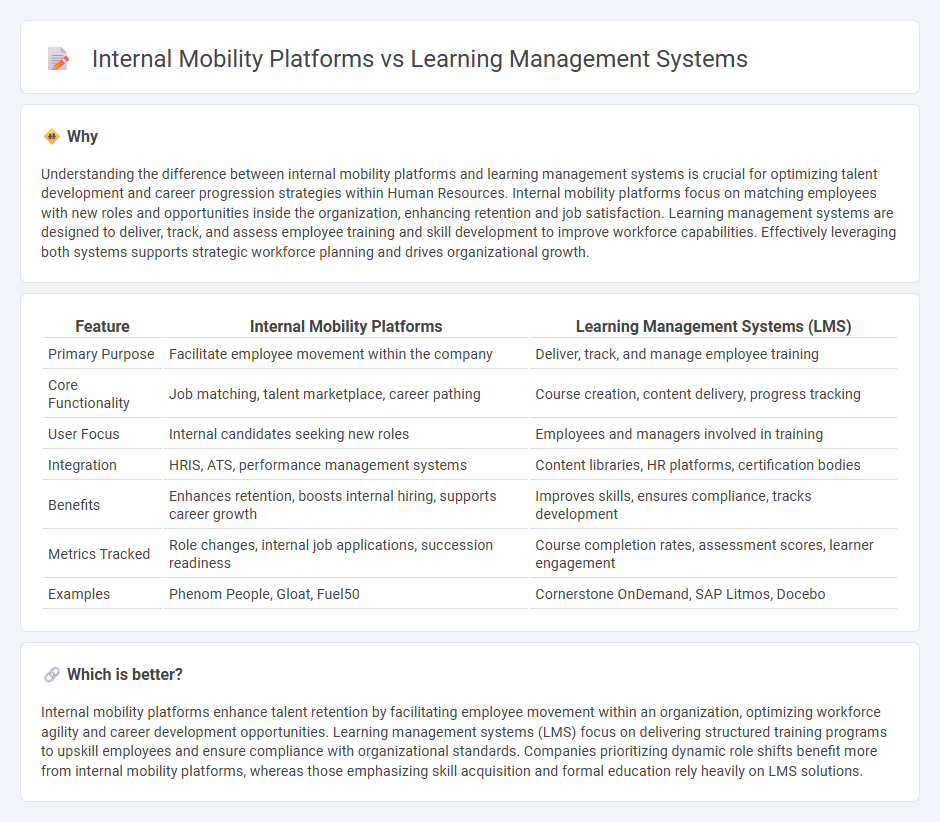
Internal mobility platforms facilitate employee career growth by matching skills and aspirations with available roles within the organization, enhancing retention and engagement. Learning management systems (LMS) focus on delivering, tracking, and managing educational courses and training programs to develop employee competencies. Explore how integrating these tools can maximize workforce potential and streamline talent development strategies.
Why it is important
Understanding the difference between internal mobility platforms and learning management systems is crucial for optimizing talent development and career progression strategies within Human Resources. Internal mobility platforms focus on matching employees with new roles and opportunities inside the organization, enhancing retention and job satisfaction. Learning management systems are designed to deliver, track, and assess employee training and skill development to improve workforce capabilities. Effectively leveraging both systems supports strategic workforce planning and drives organizational growth.
Comparison Table
| Feature | Internal Mobility Platforms | Learning Management Systems (LMS) |
|---|---|---|
| Primary Purpose | Facilitate employee movement within the company | Deliver, track, and manage employee training |
| Core Functionality | Job matching, talent marketplace, career pathing | Course creation, content delivery, progress tracking |
| User Focus | Internal candidates seeking new roles | Employees and managers involved in training |
| Integration | HRIS, ATS, performance management systems | Content libraries, HR platforms, certification bodies |
| Benefits | Enhances retention, boosts internal hiring, supports career growth | Improves skills, ensures compliance, tracks development |
| Metrics Tracked | Role changes, internal job applications, succession readiness | Course completion rates, assessment scores, learner engagement |
| Examples | Phenom People, Gloat, Fuel50 | Cornerstone OnDemand, SAP Litmos, Docebo |
Which is better?
Internal mobility platforms enhance talent retention by facilitating employee movement within an organization, optimizing workforce agility and career development opportunities. Learning management systems (LMS) focus on delivering structured training programs to upskill employees and ensure compliance with organizational standards. Companies prioritizing dynamic role shifts benefit more from internal mobility platforms, whereas those emphasizing skill acquisition and formal education rely heavily on LMS solutions.
Connection
Internal mobility platforms and learning management systems (LMS) are interconnected through their shared goal of talent development and retention within Human Resources. Internal mobility platforms leverage LMS data to identify employee skills gaps and recommend targeted training programs that prepare staff for new roles. This integration enhances workforce agility by aligning career development paths with organizational needs and employee growth opportunities.
Key Terms
**Learning Management Systems:**
Learning Management Systems (LMS) are specialized platforms designed to deliver, track, and manage educational content efficiently across organizations, making employee training scalable and measurable. LMS solutions like Moodle, Canvas, and TalentLMS support diverse learning formats, including e-learning modules, quizzes, and certifications, driving skill development and compliance adherence. Explore how integrating advanced LMS features can transform workforce learning and elevate organizational performance.
Course Delivery
Learning Management Systems (LMS) specialize in delivering structured online courses with features like progress tracking, assessments, and content management to enhance employee skill development. Internal Mobility Platforms facilitate career growth by promoting job opportunities and skill matching within organizations but offer limited course delivery capabilities. Explore how integrating these systems can optimize employee learning and career progression.
Skills Assessment
Learning management systems (LMS) primarily facilitate skill development through structured courses and training modules, enabling organizations to track employee progress and competency growth. Internal mobility platforms emphasize skills assessment by mapping employee capabilities to internal job opportunities, promoting career advancement and talent retention. Explore how integrating both systems can optimize workforce skills alignment and enhance organizational agility.
Source and External Links
Learning Management System (LMS) - TechTarget - A software application or web-based technology used to plan, implement, and assess specific learning processes, commonly used in educational and corporate settings.
Learning Management System - Wikipedia - A software application for the administration, documentation, tracking, reporting, automation, and delivery of educational courses or training programs.
Learning Management System, LMS Software - Instructure - An educational platform centralizing online learning materials, interactions, and communications, such as Canvas LMS.
 dowidth.com
dowidth.com